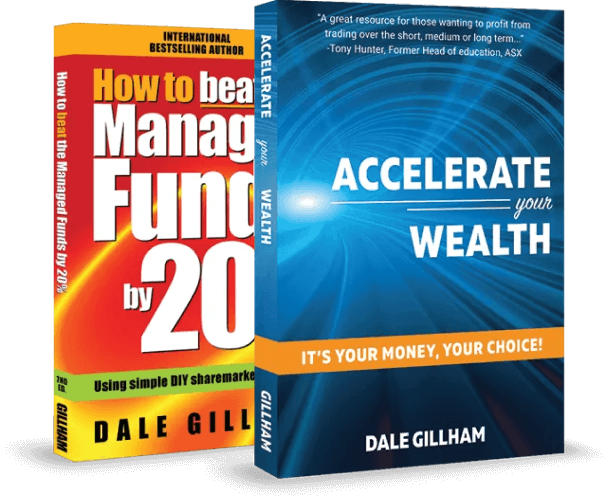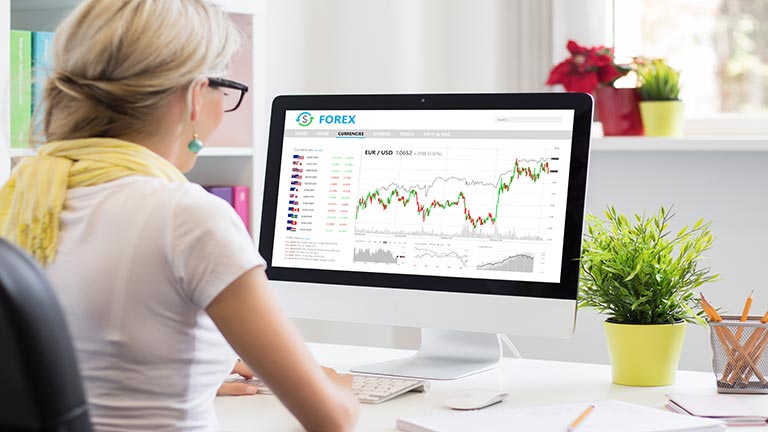Wealth Within Case Studies
Mark Bennell
Mark Bennell provides a review of his experience while studying with Wealth Within. According to Mark, after the completing the Diploma with Wealth Within, the pieces of the puzzle were able to fit together properly, which increased his confidence in his analysis and abilities.
Mark has been trading full time for 5 years and prior to that he traded part time for 3 years in Australian and US equities, currencies, commodities and indices. Mark lives in Melbourne and prior to taking up trading as a profession, he was a general manager. Mark’s attention to detail, statistical and analytical skills have provided him with the ability to easily read and understand charts, systems and concepts. His hobbies include playing guitar, cycling, exercising, reading and spending time with family and friends.

How and when did you first become interested in the markets?
While I was working full time my Father introduced me to share trading around 2005 as a way to diversify my savings, grow my wealth into the future and to provide for retirement. I was introduced to his broker and gained some interesting insight into the fascinating world of trading.
And then what happened?
I promptly opened up a trading account and commenced trading with some basic charting knowledge. The stocks selected produced good gains and I finished my first trading year with a very reasonable trading profit. This further increased my interest in committing more time to understand how to trade more effectively.
I began to research the various methods used to analyze stocks and discover ways to better my knowledge. I read trading and investing books and attended a few seminars. Early on I was introduced to some reasonably advanced techniques and began implementing this new style and methodology into my trading. My trading and analysis went to another level with this new found knowledge, relatively sophisticated platform and increased enthusiasm. I was trading with increased capital and I was impressed with my results.
I left my long term employment and decided to take some leave and I decided that I would increase my trading as I felt there was a great opportunity to earn a considerable income as a full time trader. This was around the time of the GFC and needless to say I was ill prepared for this type of market condition and learned some valuable trading lessons. It was at this point that I decided I needed to either make a serious commitment and better educate myself or return to the workforce.
How have you been able to learn and to educate yourself about the markets?
After making this commitment, I set about to learn as much as I could in the shortest amount of time possible. I attended free and paid seminars and workshops, read numerous books and studied a large amount of material. While I have been able to glean worthwhile knowledge from this, some more so than others, this blanket approach however, did lead to some confusion and a feeling of overwhelm.
Whilst I had gained a large amount of overall knowledge from my previous studies, the Diploma of Share Trading and Investment from Wealth Within was the most well structured course I have undertaken. As well as providing me with the correct and additional techniques, the course put everything I had previously learned into the right context and perspective and reinforced the importance of the bigger picture and specializing. The pieces of the puzzle were able to fit together properly and this further increased confidence in my analysis and abilities.
Did you make mistakes when first starting out?
I’ve made plenty of mistakes. I don’t believe any successful trader hasn’t made a myriad of mistakes. We’re emotional beings and as such we have to learn to work with and control our emotions. It’s an essential part of the process and it’s what we learn from our mistakes and emotions, that is of utmost importance to our development.
Some of my mistakes include: trying too much too fast, jumping from one market and / or system to another and not specializing, over and under trading, hesitation, impulsiveness, trading too short or long term, taking advice or recommendations without proper filtering, being influenced, over and under analyzing, overlaying too many indicators, case building, rationalizing holding a losing position, not looking at the big picture, letting a loser run, cutting a profit short, not following my trading plans, being too rigid, being too biased, trading too large or too small, not preparing properly, not testing a strategy or system properly and so on.
Would you define yourself as a discretionary trader, a mechanical trader or a combination of both?
I am very much a combination of both, but to varying degrees depending on the time frame and market. I use discretion in regards to my analysis and view of the macro environment and other factors that can affect the potential of a trade.
I then introduce the mechanical side which relates to the setups, signals and rules I have devised and this sets the stage for a possible entry into a position. Once these rules have been met and a position taken, the trade is then managed via a similarly mechanical approach.
The mechanical side removes a lot of the emotion involved in decision making and the discretionary side allows me to vary my risk, entry and exit strategies accordingly. This applies equally, but to varying degrees for equities, currencies or indices. My short term trading requires a different level of discretion, a higher level of intuition and quick response, especially from a bar by bar analysis perspective. There isn’t much time for a detailed mechanical approach that hasn’t become second nature.
Who have been some of your mentors and role models? What impact have these people made on you personally as well as on your trading style?
I take after my father in a lot of ways and he taught me well over the years. He was able to nurture my detailed and analytical nature and from his impeccable work ethic, thoroughness and high standards I learned that if something is worth doing, it’s worth doing to the best of your ability.
Some of the individuals that have had an impact on my trading have been Dale Gillham from Wealth Within who has been able to use his wealth of knowledge and experience to evaluate where I am positioned in my trading journey and is able to provide genuine and valuable observations that assist in redirecting my path. Darryl Morley is another example of someone who walks the talk and his no nonsense attitude, realistic approach and simplified training style have also enabled me to engage the markets with confidence.
Can you give us a brief overview of your trading style?
I have a preference for short to medium term and intraday equities, short to medium term FX and short term futures. I have been fortunate enough to have been able to try various markets and instruments and decide which of these resonates with my personality and style.
I use similar techniques on each on these markets to create the higher time frame context, so essentially the skills are transferable; however it is important to modify my strategies to allow for the nuances of each market and time frame. With regard to equities, I apply a top down approach which includes the macro picture of world indices, commodities, bond markets, right down to the relative strength comparisons of Australian sectors. I then base my risk profiles on this macro analysis.
This macro analysis allows me to step aside and wait for conditions to improve, take a smaller position, scale into a position upon further confirmation or other strategy, or shift more focus to other markets or time frames.
I don’t limit myself to the ASX top 300 and quite often the mid to smaller cap stocks will provide better returns, however I put limits on the minimum liquidity required. I analyze the higher time frame chart of a possible trade using Dow theory, Elliott Wave theory, components of Gann’s work and theories, trend lines, channels, cycle theory, harmonics, pattern recognition, some statistical analysis, components of other analysis techniques, candlestick pattern analysis and basic fundamental analysis.
I use some select trend and momentum indicators that I understand, not for buy and sell signals but purely to add value to basic chart analysis. I apply this analysis to monthly, weekly and daily charts, but I will apply more short term bar analysis techniques to daily charts when price is creating or has created a valid setup. I look for certain mechanical setups, patterns and triggers that I have found to be consistently profitable. I try to evaluate the current situation from a well-reasoned objective perspective.
I will then manage the trade using a couple of techniques as I prefer to let price tell me when it is time to exit rather than be too rigid in my exit rules.
Short to medium term FX trades are analyzed in a similar way with the preferred time frames being daily, 4h and 60m.
Short term futures trading is far more psychologically intensive and decisions are made more from an intuitive assessment of the internal supply and demand forces within price itself. Entries are a little more important to reduce risk as is the importance of my own psychology. While the bigger picture provides the framework for price to move, I use slightly different techniques for the shorter time frames to fine tune entries. Journaling and review processes are an extremely important part of my ongoing development.
Is there any one trade (win or loss) that had a profound effect on your development as a trader? If so, what did you learn from the trade?
Usually the significant losers stand out more than the big winners for reasons which I won’t go into here, but one such example for me is Galaxy Resources (GXY) during the GFC. The story was very positive and the small updates of encouraging information kept me interested despite the price action which clearly indicated a downward trend.
Once price had broken through my tentative stop loss area I was now operating from a hope basis and had no plan to deal with this from a technical or emotional perspective. The trade continued to spiral downwards to the point where I was so fed up with the trade and more to the point, myself for allowing this, that I finally closed the trade out for a loss of around 75%.
Looking back I now realize that any positive news and subsequent mild rally in the downtrend was simply a chance for losing long traders to exit their positions and for others to either add to or initiate new short positions. When I didn’t adhere to my plan and allowed myself to break the rules, I didn’t have a plan, but merely poor rationalizations for my lack of discipline.
The main lessons were that price discounts everything, the chart tells me what I need to know, strenuously stick to my plans and don’t let a losing trade spiral out of control to the point where I have no plan and where that spiraled loss becomes emotionally destructive.
Can you tell us about your best and worst trades?
My best trades are when I adhere to my trading plans, regardless of the outcome as these build the discipline required. A couple of my best percentage return trades are Sandfire Resources (SFR) with a profit of over 100% in three weeks and Cockatoo Coal (COK) coming off a low base with a profit of 51% in 11 days. These results are not based on the use of leverage.
It is important to note that it’s all fine to make 50% return on a trade, however if your initial risk is 50% (or worse still, undefined), then the risk to reward isn’t that attractive and perhaps the trade should have been avoided in the first place. I prefer to base my returns on a reward to risk or R multiple basis.
My best risk to reward trade was Insurance Australia Group (IAG) where the trading time frame setup was daily and the entry chart was 60m intraday giving me a small percentage stop loss of 0.7%. I scaled the last portion of the trade out for a return of 8.7% or 12R, giving me an average over the trade of around 6R. Total trade length was 16 days.
My worst trade was Galaxy Resources (GXY) as mentioned above, which was during the GFC and even though there was positive news flow regularly, just enough to keep me hopeful, I eventually exited the trade for a loss of around 75 percent.
Would you classify yourself as a short-term or a long-term trader? What advice would you offer to people getting started as traders on the relative merits or otherwise of each?
I am more a short to medium term trader. At this stage long term trading doesn’t suit my personality.
Shorter term intraday trading has its benefits in that trades are usually completed quickly and can provide a more regular source of income. Trades are generally closed by the end of the session or day and there is usually no holding of large positions overnight. Those that want action quickly and are less patient are probably more suited to this style of trading; however a higher level of psychological control and a focused commitment of time is required.
Medium term trading on higher time frame charts such as weekly or daily requires less intense psychological control and is more suited to individuals who are more comfortable thoroughly planning each trade and are happy to let the trade unfold with minimal trade management.
It is important that anyone getting started trading has the opportunity to find what suits them and is a good fit. There are many trading platforms that offer simulated or demo trading where individuals can test out their knowledge and strategies on various markets, instruments and timeframes ranging from ultra short to long term before risking capital.
What markets do you trade and which markets do you prefer? Do you have a favourite, and why?
I actively the trade the Australian equities market using Contracts for Difference (CFDs) on a short to medium term and at times an intraday basis. This is my favorite market and preferred time slot to trade.
I also trade the FX and commodity markets short to medium term from daily charts down to very short time frame charts. My preference is daily, 4h and 60m time frames.
I trade Futures using short time frame and other charts with Indices and commodities being my preferred markets. I really enjoy this type of trading and the challenge it brings.
I will only direct more focus and attention to these other markets when my preferred market, the Australian equities market, is not providing enough opportunity due to the macro environment and my assessment of the associated risk, as I don’t believe it is possible to effectively trade these markets and instruments simultaneously or consecutively, especially short term futures.
What makes your trading style different from others? What sets you apart from other traders?
I am comfortable trading on a weekly time frame right down to a 5m chart and anything in between over different markets and instruments. This allows me the flexibility to vary my strategies, follow the markets that are trending and helps reduce churning and reliance on markets that may be in a less conducive phase.
Do you have a favourite trading rule?
I was fortunate enough to begin to study Elliott Wave Theory early on and this overlay is one of the analysis techniques that makes complete sense and resonates with me.
In terms of general trading strategy rules: Always refer to the big picture and trade with the current trend. Generally, don’t try to catch tops and bottoms, unless applying a specific pattern and strategy. No case building, if I have to look too hard to find a pattern, setup or entry, then there probably isn’t one. Generally, price discounts everything, let the chart tell you.
In terms of psychological rules, some of my favorite rules that I use are: “Trade what you see, not what you think”, “trade on confirmation, not speculation” - borrowed from Dale Gilham, “If in doubt, stay out” and “I’d rather be out of the market wishing I was in, than in the market wishing I was out” and “be rigid in your rules and flexible in your expectations”.
Ed Seykota says, “Everybody gets what they want from the markets.” What do you ‘get’ from the markets?
That’s quite simple. I get tremendous satisfaction and a real sense of accomplishment and achievement when a well thought out trade comes together, especially one where I have followed my trading plan to the letter. I enjoy continuing to learn about trading the markets and learning about my own psychological makeup. I enjoy being tested and challenged in terms of my knowledge, skills and psychology on a daily basis and knowing that each day I am honing my skills and getting closer to my goals. In essence, I am continually being educated by the markets.
How has trading affected your lifestyle?
Trading allows me to conduct my analysis, trading and other related tasks generally when it suits me. There are times when I prefer to trade and times when I prefer to undertake other trading tasks. The markets are always providing opportunities so I can prepare and take advantage of the times when I am in my peak mindset, especially in regards to executing short term trades.
If the markets are not conducive to my style, I can spend less time trading and more time on other trading related tasks or choose to take time off without feeling guilty. I am satisfied as long as I feel I have completed the majority of what I set out to achieve at the start of the week, regardless of when it was done.
What books, seminars and courses have you read or attended and which would you recommend?
Dale Gillham’s book How to Beat the Managed Funds by 20% is a worthwhile read and provides an insight into what an individual can do with a few easy to understand concepts and techniques.
The Diploma of Share Trading and Investment from Wealth Within is a well structured and comprehensive course that provides excellent knowledge and strategies for those serious about trading and investing. The book Reminiscences of a Stock Operator - The story of Jesse Livermore is excellent. In the area of trading psychology, anything from Mark Douglas and Dr Brett Steenbarger.
What does the future hold for you?
It is important for me to continually evolve as a trader and work towards my goals. Part of that process is to refine and simplify my methodology and processes and to continue to improve my trading psychology. This will also be in line with keeping more to a regular routine with the view to trade less and focus only on high quality, low risk opportunities.
Insights From Our Learning Centre


Learn the concepts as to how you can accelerate your wealth using simple DIY investment strategies that will enable you to take control of your investments. Dale Gillham, bestselling author, shows you how to invest with confidence to achieve very profitable returns.
Browse BooksOr Browse By Topic
5 Stars
Years in business delivering high-quality education
of students rate the quality of education as excellent or very good
of students recommend Wealth Within



